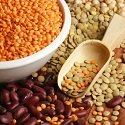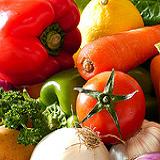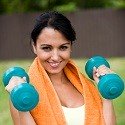Low Fat High Protein Diet and Foods
Sample of Low Fat High Protein Diet Meal Plan, Lean Protein Diet, High Protein Diet Foods, High Protein Diet Side Effects, Lean Protein Sources
Here at Lose Weight With Us, we are strong believers in a balanced diet, i.e. the right amount of carbs, protein and good dietary fat which provides for a long term sustainable healthy lifestyle. The downside of course is that weight loss may take a bit longer, which is why alternatives are sought such as a high protein diet, of which the Atkins Diet is one of the most well-known, because you want to lose weight quickly. High protein diets are also popular as in a number of western countries, our diets and our bodies have simply got used to an incorrect balance of too much protein and bad carbs (such as potatoes, white flour, white sugar etc.), so moving to a high protein, low carb diet appears to make sense.
Low fat high protein diet plans are the same as body building diet plans, many weight loss diets recommend high levels of protein as recent studies conducted have shown that you can lose weight by increasing your protein intake. The daily protein requirement for a high protein low fat diet is 1g of protein per 1 pound of body weight. Consumption of fat should be limited to 30 grams daily. The impact can be pretty quick, losing pounds quickly. It’s unlikely though that you will keep up a high protein diet for more than a few months, and then what are you going to eat. So if you do embark on a high protein diet at least consider what diet you will move on to that is sustainable, rather than go back to your old ways that contributed to your weight gain in the first place. Read more about healthy eating.
Protein and Weight Loss:
What are the effects of a high protein diet on weight loss?
- The major sources of protein include red meat, chicken, fish (tuna and sardines are particularly high), legumes (e.g. soy beans, lentils) and some seeds such as sunflower and quinoa. The aim of eating protein is so that you feel full and continue to feel full so you do not over eat and control your intake of calories.
- Protein should not affect the blood sugar balance that eating bad carbohydrates would. It helps to avoid hunger patches, so you can diet without hunger.
- Combine the high protein diet meal plan with a regular exercise program for best weight loss results. Protein helps you build muscle mass. Muscle tissue requires a higher number of calories for maintenance. This means that your body will burn more calories even when you are sitting around and doing nothing.
Fat and Daily Protein Requirements:
When following a low fat high protein diet, it is recommended that the intake of protein should be around 20-35% of your total calorie intake and at least 25 % of your daily calories from fat.
Lean Protein Foods, High Protein Low Fat Foods:
|
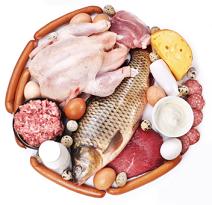 |
Sample of Low Fat High Protein Diet Menu:
Eat small meals every 2 to 3 hours. Every meal should include lean protein (fish, chicken, meat, eggs). You are allowed carbs only from fruit and vegetables, which you can have with every meal. Drink plenty of water 8 glasses minimum daily, also you can have calorie free beverages. Your meals should consist of solid foods, not liquid.
-
Breakfast:
3 egg whites scrambled
1 slice of lean ham
Steamed spinach
Morning Snack:
8 almonds
Lunch:
½ can of tuna in brine
Mixed leaf salad
Afternoon Snack:
Low fat cottage cheese and pineapple
Dinner:
4 oz. grilled beef steak
Lettuce and cucumber salad with the dressing made of 1 tbsp. of olive oil and vinegar.
High Protein Diet Dangers
What are the dangers of a high protein diet? For most healthy people, a low fat high protein diet generally isn't harmful if followed for a short time, and may help with weight loss. Eating a large amount of protein may lead to Ketosis (nausea, tiredness) due to a lack of carbohydrates. This is because the body is burning fat, instead of carbs. Additionally it’s been reported that there is a high risk of osteoporosis or bone loss and kidney failure. It may also cause alcohol consumption to increase. If the fat consumed with the diet is saturated, then there is further risk of heart disease. Learn more about eating healthy to lose weight.Author: Lana Soko
You Might Also Like:
Want to Learn More?
Like This Page?
|
Share This Page:
|
Search Our Site:

Free E-Book:
We Recommend:
Looking to get your body into great shape? Get the very best results for your efforts and money! Save your valuable time from surfing the internet. These are theBestselling Weight Loss Programs
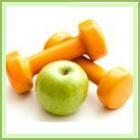
Programs that work and have thousands of satisfied customers worldwide!

 |

